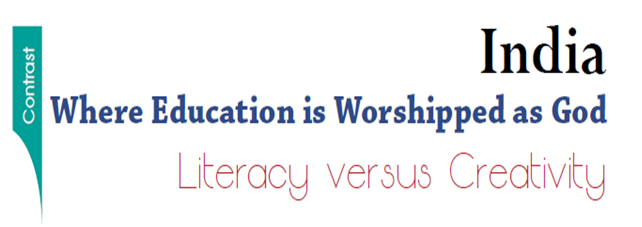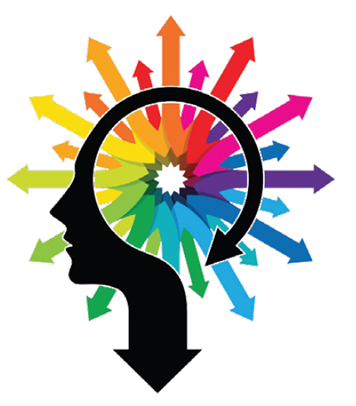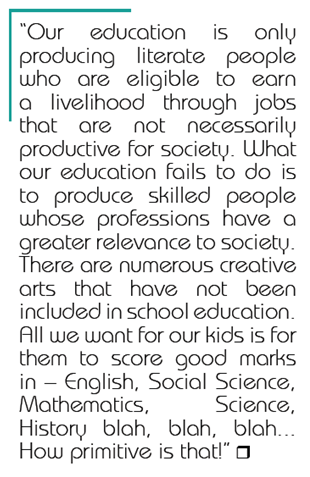
This article is not meant to downplay the brilliant performance of our academically bright students. Nor it is meant to explain away the below-average performance of others. Nonetheless, even as we let the dust settle after the announcement of the results of our national board exams, we do well to ponder the educational system once again.
“We have a huge vested interest in education. Partly because it is education that’s meant to take us into this future that we can’t grasp” says Sir Ken Robinson. This is a remarkable diagnosis of our defective posture on education. Is extolling education as our sole guiding light into the future justifiable? Given, the utter unpredictability of our future and the historic inadequacy of education to solve our simple socio-economic irregularities, let alone solving life’s deepest problems, hailing education as the sole saviour seem superfluous. How silly to tell our children that it is education that will help you to trump all in the future when we know that the country is largely paralyzed by the mess created by so-called educated ones! Look at our administrative machinery, for example.
India is a classic example of ‘a blind devotion to education misfiring’. A friend of mine rightly pointed out that education has become god in India. Parents are ready to do anything for their children’s education from spending their entire earnings to selling property to taking out huge loans to sending them to far away boarding schools at young ages. Some children have experienced a complete relational rupture with their parents because they had to leave home at a tender age and no longer enjoyed close bonding. After all these sacrifices made on the altar of education, what India has gained is very little to be proud of. To put it bluntly, India’s education has not done anything extraordinary to stun the rest of world. Indian academia and intelligentsia are, at best, the imitation of their western counterparts and therefore, they are so far removed from India’s ground realities. Our education has done very little to advance India.
all these sacrifices made on the altar of education, what India has gained is very little to be proud of. To put it bluntly, India’s education has not done anything extraordinary to stun the rest of world. Indian academia and intelligentsia are, at best, the imitation of their western counterparts and therefore, they are so far removed from India’s ground realities. Our education has done very little to advance India.
Another sad and no less significant reality is that, corruption amongst educated Indians is sickeningly high. Some of the most corrupt Indians have been those who have also been the brightest academic minds.
To my mind, the most worrying reality is the paralysing effect of the educational divide in India. There is an almost unbridgeable gap between those who are educationally bright and those who are below average. It is the “marks” on their report card that divide them. Students with high scores have the inherent right to monopolise career contests and they walk away with all the possibilities of a good life. The ones with average and below average marks are left with almost no chances of making a career. A few lucky ‘street-smart’ people pull off a miraculous professional accomplishment through lateral entry. But such success stories are rare. Overall, India’s success stories are inappropriately confined to those who have scored a good percentage in school exams. Simply put, India’s successful people have been those who perform well with ‘textbook learning’ (reading, memorizing and writing answers in exams).
Herein lies the answer to why Indian education has (a) not made a huge difference in changing India into a better place in which to live and (b) not done anything remarkable to attract global attention.
Ours is purely a literacy-oriented education. What is drummed into children’s minds is that  being able to memorise answers from textbooks and write them correctly in exams is education. As they grow up, they keep doing it until they finally graduate. They hold their nose to the grindstone, reading their textbooks over and over again. They are trained to predict the kinds of questions that could be asked in their examinations. And then they are force-trained to learn the answers by heart. There are at least two drawbacks to this kind of education. First, it is their memory that fetches them marks, not necessarily their understanding. Remember, intelligence is not the measure of one’s memorizing ability. There are eons of super-intelligent and extremely talented people having a poor or zero memorizing capacity. The art of mnemonics is important but, unfortunately, the design of our education is so skewed that it has become the predominant factor for assessing academic excellence. And the disastrous reality is that most of our toppers are merely the mnemonists or master-memorisers who are good at committing facts, figures and pre-scripted answers to memory. Often, originality is striking by its absence.
being able to memorise answers from textbooks and write them correctly in exams is education. As they grow up, they keep doing it until they finally graduate. They hold their nose to the grindstone, reading their textbooks over and over again. They are trained to predict the kinds of questions that could be asked in their examinations. And then they are force-trained to learn the answers by heart. There are at least two drawbacks to this kind of education. First, it is their memory that fetches them marks, not necessarily their understanding. Remember, intelligence is not the measure of one’s memorizing ability. There are eons of super-intelligent and extremely talented people having a poor or zero memorizing capacity. The art of mnemonics is important but, unfortunately, the design of our education is so skewed that it has become the predominant factor for assessing academic excellence. And the disastrous reality is that most of our toppers are merely the mnemonists or master-memorisers who are good at committing facts, figures and pre-scripted answers to memory. Often, originality is striking by its absence.
Jiwan Rai
To read the further articles please get your copy of Eastern Panorama June issue @http://www.magzter.com/IN/Hill-Publications/Eastern-Panorama/News/ or mail to contact @easternpanorama.in


